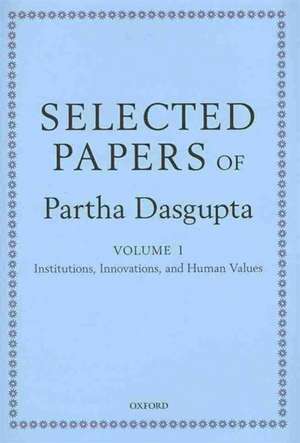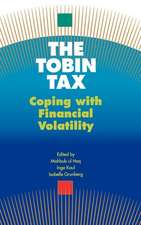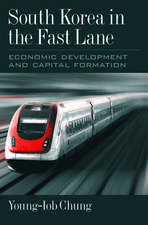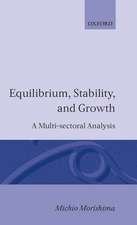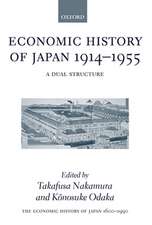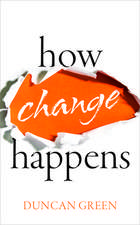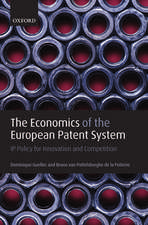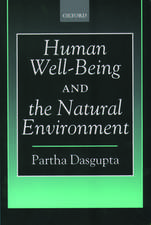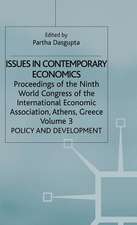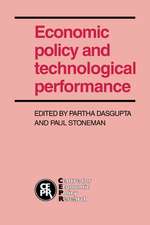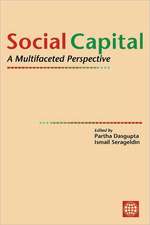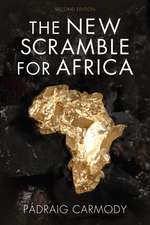Selected Papers of Partha Dasgupta: Volume I: Institutions, Innovations, and Human Values and Volume II: Poverty, Population, and Natural Resources
Autor Partha Dasguptaen Limba Engleză Quantity pack – 25 noi 2010
Preț: 1490.52 lei
Preț vechi: 2126.72 lei
-30% Nou
Puncte Express: 2236
Preț estimativ în valută:
285.30€ • 310.00$ • 239.81£
285.30€ • 310.00$ • 239.81£
Carte disponibilă
Livrare economică 19-25 martie
Preluare comenzi: 021 569.72.76
Specificații
ISBN-13: 9780199561513
ISBN-10: 0199561516
Pagini: 1010
Ilustrații: 60 Figures, 15 Tables
Dimensiuni: 181 x 253 x 66 mm
Greutate: 2.18 kg
Editura: OUP OXFORD
Colecția OUP Oxford
Locul publicării:Oxford, United Kingdom
ISBN-10: 0199561516
Pagini: 1010
Ilustrații: 60 Figures, 15 Tables
Dimensiuni: 181 x 253 x 66 mm
Greutate: 2.18 kg
Editura: OUP OXFORD
Colecția OUP Oxford
Locul publicării:Oxford, United Kingdom
Recenzii
Intellectual Tour de Force The two introductions to the volumes present glimpses of the exciting but tangled path of research inquiry traversed by the eminent mind, over more than four decades. The way Dasgupta chose the problems, teamed up with other eminent minds, responded to unforeseen difficulties, changed track, and so on, will definitely fascinate the curious reader. Given that deep and profound ideas are not in plenty in the world of social sciences, we have good reason to celebrate the publication of these two volumes of selected papers of Partha Dasgupta, as the number of ideas per page in the two volumes turns out to be one of the highest.
If ever there were a case of sustained, serious, technical economics applied to fundamental issues of human development and social policy, the life work of Partha Dasgupta is it. This splendid collection of essays is full of neat ideas, surprising ideas, and deep ideas. Watching a good mind- sometimes two minds- turn the warm and fuzzy into the precise and rigorous is itself a profound pleasure.
These volumes collect in one place Partha Dasgupta's wide-ranging and penetrating essays on the economics of institutions, innovations, human values, poverty, population, and natural resources. The assembled papers show the power of rigorous economics to illuminate fundamental policy problems.
Sir Partha Dasgupta is one of the most distinguished economists of our times and this collection is an essential reader for students and researchers in economics. As an economist working in a developing country, I have found Prof. Dasgupta's writings as the definitive guide to understanding issues of welfare, development and environment.
These volumes provide an authoritative journey through the origins, conception, and birth of the brilliant ideas and powerful analyses that have shaped Professor Dasgupta's outstanding contributions to the theory and practice of resource allocation economics. A necessary and enriching source of key concepts and methods; they thoughtfully weave together threads of scientific knowledge that span ecology, political philosophy, ethics, social choice, and development studies.
An intellectual voyage that looks into the philosophical aspects of economic thinking with the same ardor as it does the small intricacies of mathematical modeling. Professor Dasguptas work is a compulsory reference, not the least for the hundreds of scholars in developing countries that have been touched by his warm dedication to capacity building. Its message is clear: look at the key, sometimes overlooked details of the picture without losing sight of the larger, supporting conceptual framework.
Each of the papers in these volumes is a jewel. Together, they are a treasure. Dasgupta's oeuvre speaks of compassion, sharp observation, and above all analytical brilliance. More than a collection of great papers, this work catalogues the reasoning of an extraordinary mind, determined to address the most important problems of our age. In Dasgupta's hands, economic theory fulfills its true promise, explaining why some people are destitute in a world of plenty, why natural resources that should be husbanded are plundered, why fertility remains stubbornly high in places that cannot sustain a high population, and much, much more. His theories also tell us how policy can right these wrongs. When I need inspiration, I shall look here.
If ever there were a case of sustained, serious, technical economics applied to fundamental issues of human development and social policy, the life work of Partha Dasgupta is it. This splendid collection of essays is full of neat ideas, surprising ideas, and deep ideas. Watching a good mind- sometimes two minds- turn the warm and fuzzy into the precise and rigorous is itself a profound pleasure.
These volumes collect in one place Partha Dasgupta's wide-ranging and penetrating essays on the economics of institutions, innovations, human values, poverty, population, and natural resources. The assembled papers show the power of rigorous economics to illuminate fundamental policy problems.
Sir Partha Dasgupta is one of the most distinguished economists of our times and this collection is an essential reader for students and researchers in economics. As an economist working in a developing country, I have found Prof. Dasgupta's writings as the definitive guide to understanding issues of welfare, development and environment.
These volumes provide an authoritative journey through the origins, conception, and birth of the brilliant ideas and powerful analyses that have shaped Professor Dasgupta's outstanding contributions to the theory and practice of resource allocation economics. A necessary and enriching source of key concepts and methods; they thoughtfully weave together threads of scientific knowledge that span ecology, political philosophy, ethics, social choice, and development studies.
An intellectual voyage that looks into the philosophical aspects of economic thinking with the same ardor as it does the small intricacies of mathematical modeling. Professor Dasguptas work is a compulsory reference, not the least for the hundreds of scholars in developing countries that have been touched by his warm dedication to capacity building. Its message is clear: look at the key, sometimes overlooked details of the picture without losing sight of the larger, supporting conceptual framework.
Each of the papers in these volumes is a jewel. Together, they are a treasure. Dasgupta's oeuvre speaks of compassion, sharp observation, and above all analytical brilliance. More than a collection of great papers, this work catalogues the reasoning of an extraordinary mind, determined to address the most important problems of our age. In Dasgupta's hands, economic theory fulfills its true promise, explaining why some people are destitute in a world of plenty, why natural resources that should be husbanded are plundered, why fertility remains stubbornly high in places that cannot sustain a high population, and much, much more. His theories also tell us how policy can right these wrongs. When I need inspiration, I shall look here.
Notă biografică
Sir Partha Dasgupta was born in Dhaka (at that time in India) and educated in Varanasi, Delhi, and Cambridge. He taught at the London School of Economics during 1971-1984 and moved to Cambridge in 1985. During 1989-1992 he was also Professor of Economics and Philosophy at Stanford University. In addition to research and teaching at his home university, Professor Dasgupta has been much involved in introducing environmental and resource economics in Universities in Africa and South Asia. He is a Founder Member of the South Asian Network of Development and Environmental Economists, SANDEE and a Founding Member of the Editorial Board of the quarterly journal Environmental and Development Economics. He is a Fellow of the British Academy, Fellow of the Royal Society, Member of the Pontifical Academy of Social Sciences, and Foreign Member of the US National Academy of Sciences. His previous book was Economics: A Very Short Introduction (OUP, 2007).
